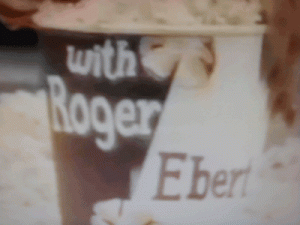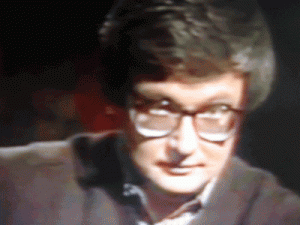 “This is my happening and it freaks me out.”–Roger Ebert, in a line from his movie Beyond the Valley of the Dolls
“This is my happening and it freaks me out.”–Roger Ebert, in a line from his movie Beyond the Valley of the Dolls
There he was on television again after all this time: Roger Ebert, the movie critic, on the Oprah Winfrey show. By now, movie lovers have seen and heard of Ebert’s troubles. The battles with thyroid cancer, the loss of his jaw, the inability to eat, and the crushing loss of speech. Now he’s left with a dangling lump of flesh and a permanent smile.
But he soldiers on–in fact, the man is happy: married, working, living. Oprah spoke lovingly of his wife, Chaz, who has given up her career as a trial lawyer to run his affairs and to take care of him. It was a truly touching moment. Chaz Ebert described her husband as”A man who respects women,” and Winfrey, her audience, and Ebert, agreed. His eyes are bright and communicative, and his gesticulations remain expressive, if not more so than before he lost his ability to speak. In this way, he was able to tell us all how much he loved and admired her.
Despite my admiration, or perhaps because of it, I had to chuckle. What a crazy, wonderful life. Roger Ebert: Movie Critic. Writer. Historian. Television Personality. Pundit. Cancer survivor. And writer of Russ Meyer’s <em>Beyond The Valley of the Dolls</em>, Beneath the Valley of the Ultra-Vixens, and Up!–definitely not to be confused with the latest Pixar classic.
According to an article in the recent Esquire, Roger Ebert has been busy. “There is no need to pity me,” Ebert writes to the magazine’s Chris Jones. “Look how happy I am. This has led to an explosion of writing.” His reviewsand blog entries, both in the Chicago Sun-Times (where he’s worked since 1967), cover as much ground in the world of film as two healthy film critics, and five or six bloggers tossed in for good measure. His journal is fascinating, observations on his life and the world around him.
At one point in the article, Ebert mentions that someone, or many people, asked if he would ever write an autobiography. “[H]e looks up from his laptop and shrugs at the thought,” Jones writes. “He’s already written a lot about himself on his journal, about his little childhood home in Champaign-Urbana and the days he spent on TV and in hospitals, and he would rather not say the same thing twice.”
Well, if I may be so bold, I entreat him to write that autobiography. Christ, I beg of him. I want to know about the life of Roger Ebert, about his journey, and here’s why.
Roger Ebert was my favorite movie critic as a child. Yes, as a child: I was enough of a movie-mad boy to watch Siskel and Ebert’s Sneak Previews on Mom’s tiny color television in the basement, starting around age eleven or twelve. You have to understand the time–from the late 1970s to the early 1980s, if you lived in Mt. Pleasant, Michigan, you didn’t have many choices for movies. We had four theaters, they showed Star Wars and Rocky and little else. Showtime and HBO were on the scene, but they showed Rocky and Star Wars over and over, and little else. VCRs were years away. And when they came, it still took years for our family to finally be able to afford a machine. Even then, do you really think the local video store was going to stock Jean-Luc Godard? Well, think again.
I adored Sneak Previews and especially Ebert. His enthusiasm, which was palpable and infectious, made me feel as though I was not alone in being crazed about the movies. Siskel and Ebert both showed that it was perfectly acceptable, fun in fact, to get so excited that I literally trembled as I walked to the campus of Central Michigan University to see Bergman’s Fanny and Alexander. Or freak out that Dad would take me to Saginaw’s Temple Theater to see Singin’ in the Rain.
It further cemented my status as a weirdo at high school when I saw Ebert “live” at CMU. He came to speak, and I sat right in the front row, having arrived a couple hours early. Afterwards, I wandered campus and stole one of the posters advertising the event and stuck it in my room for years.
So naturally I would be enticed by an autobiography. I think his story is important to anyone who loves movies. For Roger Ebert is special. He is perhaps the most unique movie critic in history, rivaled only by James Agee. Like Agee, I think that Ebert not only wrote and spoke about movies, he yearned to be in them, not to act, necessarily, but to be a part of the process.
There are rumors aplenty: that Ebert, in his drinking days, used to imbibe with Robert Mitchum, and frequently. He hung out with the greats, partying and drinking. We do know that he made not one, but three movies with Russ Meyer, the master of the exploitation flick. Agee wrote for the movies, too, penning The Night of the Hunter and The African Queen, and he, too, drank with the celebrities. Kael tried to produce, but she failed.
We know (from his blog) that Ebert is an alcoholic who bravely quit drinking way before his illness ceased his alcohol consumption for him. He had a wonderfully contentious relationship with Gene Siskel, a pairing that has not been matched anywhere, in film criticism or elsewhere. Siskel and Ebert outlasted Abbot and Costello, Laurel and Hardy, Trammel and Whitaker, McNeil/Lehrer, and Simon & Garfunkel.
As a writer, I have to marvel at the narrative arc of this man’s life. Here’s a young man who becomes a movie critic, hitting the scene at precisely the right time, to champion the likes of Bonnie and Clyde, to make a sex romp like Beyond the Valley of the Dolls, and to help create the first movie critic show, Sneak Previews. That he (and Siskel) thrived in Chicago is important–that city has embraced them as no other could, and now there’s a Gene Siskel Film Center as well as Ebertfest, a film festival in Champaign, Illinois.
The epic battles between Siskel and Ebert became the stuff of legend. We now know how close they were as friends, and it’s no surprise. The closer I get to my friends, the more I argue with them, and I doubt I see my closest as often as those two saw each other. This legendary pairing turned tragic, when Siskel died young, at age 53, of a brain tumor. And now Ebert faces his own epic battle with thyroid cancer.
So all of this makes an amazing story. Perhaps Ebert has no interest in revisiting the Russ Meyer years, the time spent with Mitchum, if any–perhaps it was just a dream (Jesus, what a dream.) True, he’s written at length about his drinking, his eating, Siskel, and his cancer on his blogs and in the Sun-Times.
But a book, well, a book can go deeper, can’t it? I, for one, want to know what kicks a kid out of complacency when he’s young and makes him go as batty for film as Ebert obviously did. He grew up in Urbana, a small town, and fed on sci-fi. So did a lot of kids, and they don’t go crazy for Bergman and Bahrani. What makes a man hook up with Meyer and Mitchum, because I believe it’s probably more than just the sex and booze on the set of a picture like Up!
I have the feeling he was, for a time (maybe still), a man of excesses. But he’s also clearly a man of kindnesses, who writes fondly of Siskel, and uses his power to champion the likes of the aforementioned Ramin Bahrani.
And that’s why Roger Ebert has a lot to tell us. Mostly, it seems to me, his story is about being kind and human. For I’ve observed over the years that his negative reviews aren’t hateful and mean–frustrated at times, no doubt by having to sit through movie like Cop Out, and definitely barbed. I want to know what moves him to use his considerable fame to champion the likes of Chop Shop when he could just plug movies like Avatar and leave the little one alone. (Yes, I know he does both.)
But reading his blogs, his journals, we see a man who loves movies but also understands that there’s a life out there, too. And he knows that you can’t ignore the latter and understand the former.
That’s a great story. Sometimes the great stories never get told as fully as they should, and that’s fine, too. According to the Oprah Winfrey show, Roger Ebert is cancer free. That is good. An autobiography may be the last thing he needs or wants, and his time, however long or short, should bring him joy. He deserves that.
Maybe I do just want some gossip about Mitchum, some juicy details from the set of Beyond the Valley of the Dolls, an insider’s look into the television and film industries. Certainly, he owes his fans nothing more than he’s already given us, which is abundant and rich and even funny.
Roger Ebert has a story to tell, a great story, a weird story, an inspiring story, and though he tells a bit of it nearly every week, I want more, even if I don’t deserve more. Should he choose to write it all down, I for one will be there to read it. This is his happening, and it freaks me out, too.

